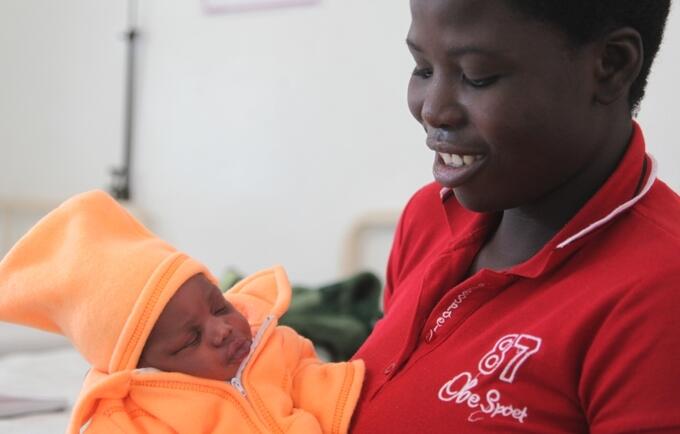GOKWE NORTH DISTRICT, Zimbabwe – After completing her nursing training at Kwekwe Hospital, Sister Violet Makaza, 29, decided to do more specialist training supported by UNFPA, the United Nations Population Fund, in October 2013. She relates how this training helped her save the life of a young mother:
“I trained in EmONC (Emergency Obstetric and Newborn Care) because I was interested in pregnant women, delivering babies and making sure that both baby and mother are healthy and safe.
“A woman staying at a maternity waiting home (had) very high blood pressure. I treated her but after four hours her blood pressure was still too high, so I thought, there is a problem here. I raised the dosage of her medication and admitted her (to Chireya Mission Hospital).”
At home later that evening, she received a phone call and was told the woman was complaining of severe epigastric pain. “I rushed back to the hospital to catheterize her and referred her to the district hospital in Gokwe South.”
Had I not picked up on the woman’s symptoms in time she may not have survived the journey to hospital.
When the patient arrived her blood pressure was still very high. She was then referred to Gweru Provincial Hospital, where she was admitted for an emergency Caesarean section.
A mother herself, Sr. Makaza says the UNFPA-supported EmONC course and the skills she had learnt inspired her to study midwifery.
“I hated that I didn’t know how to manage complications by myself. Whenever there was a pressured delivery I would have to call for the Sister-in-Charge to help. Now I can handle the situation by myself and I find that extremely empowering.”
Sr. Makaza, originally from Rusape, is now a fully trained midwife at Chireya Mission Hospital in Zimbabwe’s Gokwe North District, about 300 kilometres from the capital city of Harare.
More midwives needed in Zimbabwe
In Zimbabwe, midwifery training is carried out at 21 hospitals across the country, including at four central, eight provincial, one general and eight mission hospitals. Each year, about 360 midwives are newly qualified.

Midwives who are educated and regulated to international standards can provide 87 per cent of the essential care needed by women and their newborns, according to the State of the World Midwifery Report 2014.
Midwives provide skilled attendance during pregnancy, labour and after childbirth, ensuring safe deliveries. They provide essential care for newborns, especially in the first week of life when the risk of dying is high. They also provide information on family planning, which reduces maternal deaths by 20 per cent. Spacing pregnancies reduces the risk of women dying due to pregnancy-related complications.
UNFPA reducing shortage of midwives
In Zimbabwe, UNFPA supports the Ministry of Health and Child Care in the expansion of midwifery training through capacity building of midwifery tutors in the management of obstetric and neonatal emergencies and provision of teaching and learning materials to improve the quality of midwifery training.
UNFPA is also helping to strengthen the Zimbabwe Confederation of Midwives Association through review of midwifery practice regulations, development and costing of the association’s plans, and assessment of nursing and midwifery services.
By Victoria Walshe


